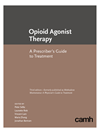Text adapted in 2023 from "Opioid Use and Opioid Use Disorders" in The Primary Care Addiction Toolkit. Available online only.
Resources for professionals
Clinical tools
Opioid Risk Tool. Primary care providers can use this brief screener to assess risk for opioid misuse among adults prescribed opioids for chronic pain. It has not been validated in non-pain populations.
Clinical Opiate Withdrawal Scale (COWS). Clinicians can use this 11-item scale in inpatient and outpatient settings to rate opiate withdrawal and monitor symptoms. It helps determine the stage or severity of withdrawal and assess the patient’s level of physical dependence on opioids.
Centre for Effective Practice. Point-of-care tools include Opioid Manager, Management of Chronic Non-cancer Pain, Urine Drug Screening and Opioid Tapering Template.
Clinical guidelines and other toolkits
2017 Canadian Guideline for Opioids for Chronic Non-cancer Pain (National Pain Centre, McMaster University)
2024 Canadian Opioid Prescribing Guideline Summary (National Pain Centre, McMaster University). Revision of the above 2017 guidelines. Full guidelines expected in autumn 2024.
Opioid Agonist Therapy: A Synthesis of Canadian Guidelines for Treating Opioid Use Disorder (Centre for Addiction and Mental Health)
CRISM National Guideline for the Clinical Management of Opioid Use Disorder (Canadian Research Initiative in Substance Misuse)
National Clinical Guideline: Injectable Opioid Agonist Treatment: iOAT for Opioid Use Disorder (Canadian Research Initiative in Substance Misuse)
Opioid Use Disorder-Related Withdrawal Management (Canadian Research Initiative in Substance Misuse)
Opioid Agonist Therapy: A Prescriber’s Guide to Treatment (Centre for Addiction and Mental Health)
A Guide to the Use of Depot Buprenorphine (META:PHI)
Buprenorphine/Naloxone Microdosing: The Bernese Method - A Brief Summary for Primary Care Clinicians (Canadian Mental Health Association)
Methadone Treatment for People Who Use Fentanyl (META:PHI)
Prescribed Safer Supply Protocols: Fentanyl Patch (British Columbia Centre on Substance Use)
Slow-release oral morphine summary for health care providers (Canadian Research Initiative in Substance Misuse)
Sample treatment agreement for long-term opioid therapy (adapted from the National Pain Centre, McMaster University)
Professional training and events
Opioid Dependence Treatment Certificate Program: Developed by the University of Toronto and the Centre for Addiction and Mental Health for physicians, pharmacists, nurses and counsellors who provide care to people with opioid use disorder
College of Family Physicians of Canada: Chronic non-cancer pain management and opioid resources that include continuing professional development for family practitioners
Opioid Use Disorder in Primary Care Conference: Annual one-day virtual event where primary care providers learn about opioid use practices, policies, treatment and harm reduction
Centers for Disease Control and Prevention: Online training on implementing the 2022 Clinical Practice Guideline for Prescribing Opioids for Pain
Resources for patients and families
Take-home naloxone kits
Some provinces and territories offer free take-home naloxone kits at most pharmacies.
The Canadian Pharmacists Association provides links to take-home naloxone kit training, including videos showing how to administer different forms of naloxone.
5 Steps to Save a Life outlines how to respond to an opioid overdose. The handout can be added to a naloxone kit or given to patients and family members.
Information about opioids and opioid therapy
Opioid FAQs for pain patients (National Pain Centre, McMaster University)
Making the Choice, Making It Work (Centre for Addiction and Mental Health). Information for people on opioid agonist therapy
Opioids: What You and Your Friends Need to Know (Centre for Addiction and Mental Health)
Opioid Agonist Therapy: Information for Clients (Centre for Addiction and Mental Health)
FAQ for patients and families about iOAT (Canadian Research Initiative in Substance Misuse)


